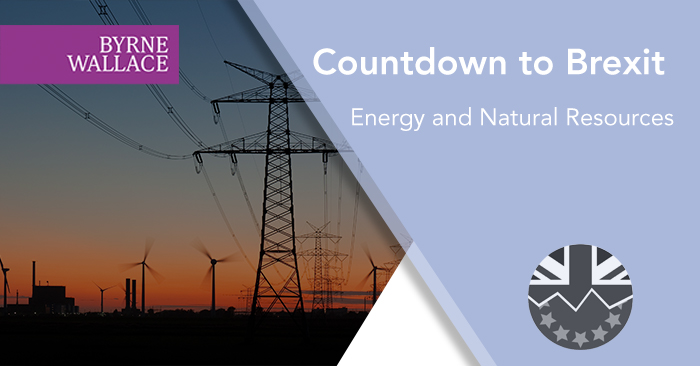Countdown to Brexit - Energy and Natural Resources
Thursday, 29 October 2020
With the Brexit deadline passed and the end of the transition period fast approaching, the ByrneWallace Brexit team address various issues which will impact upon businesses either trading with or through the UK, or with suppliers in the UK, and/or with UK staff based in Ireland or staff in the UK.
In this issue, we address Energy and Natural Resources.
Critical issues for businesses to consider:
- All Island Wholesale Electricity Market: Importantly, the Withdrawal Agreement provides for the continued operation of the Single Electricity Market on the island of Ireland. However, should the on-going EU-UK trade negotiations not result in agreement on energy issues, the current ‘day ahead’ trading arrangements in place for trading across electricity interconnectors between EU Member States will no longer be possible between the SEM and Great Britain, with the UK becoming a third country and no longer part of the EU Internal Energy Market. Although contingency arrangements are being put in place, this would most likely result in a loss of efficacy in SEM trading, which in turn would very likely have a detrimental impact on businesses, in the form of higher electricity prices.
- Gas – Security of Supply: Approximately half of Ireland’s gas imports are imported via the UK. It is expected that the current rules for trading natural gas across interconnectors with the UK will remain the same. However, in the case of any future gas supply emergency disruption, the UK will no longer be legally bound by current EU law obligations to provide Ireland with assistance. This would have a detrimental impact on businesses, in the form of higher gas prices.
- Future Regulatory Misalignment: Irrespective of whether an EU-UK trade deal is achieved, it is unlikely that market rules and network codes will continue to be aligned. Any divergence would lead to less efficient market functioning, less liquidity and less competition. Bad news for most businesses.
- EU State Aid Rules: The recently published – and very controversial – ‘Brexit Bill’, seeks to rewrite certain obligations contained in the Withdrawal Agreement, whereby EU law would be maintained by the UK from a state aid perspective. The ultimate outcome here is currently unclear. However, the bottom line is that Irish energy companies could, in theory, find themselves at a competitive disadvantage to UK energy companies were the UK ever to diverge from EU state aid rules and favour domestic energy businesses.
- Tariffs on Energy Imports: Were an EU-UK trade deal not to be achieved, this could result in the imposition of tariffs on energy imports from the UK. This however would not be a certainty - and some comfort can be taken from EU trading arrangements with the likes of Norway, Switzerland and Russia, countries which are integral to the EU's energy markets and which do not face the imposition of tariffs.
- Ireland’s Brexit-proof electric lifeline: With the UK having now formally left the EU, Ireland currently has no electricity interconnection with any member of the EU. From 31 December 2020, Ireland becomes an ‘energy island’ in EU terms. Against this backdrop, the Celtic Interconnector (between Ireland and France) has greatly gained in terms strategic importance. Though the interconnector is not due to be completed until 2026, it should ultimately serve to lower electricity prices, in tandem with providing greater energy security.
0
For more information on the above or for general advice on this topic, please contact a member of our Energy and Natural Resources team or our Brexit Team.To register for ByrneWallace updates click here, and follow us on LinkedIn.

